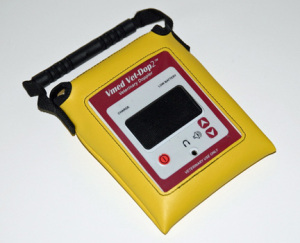Need Advice?
+1(407)-557 6073
Need help?
Payment Method
Secure Express Checkout
Save your payment information securelystripefor express checkout.
Product Description
The veterinary Vet-Dop2 is used to screen for hypertension, to check blood pressure in surgery, to monitor blood flow at the extremities during surgery and to check for intact blood vessels after trauma and before amputation. The non-invasive Doppler technique is the method of choice for measuring blood pressure in animals weighing less than 15 pounds, especially cats. Other methods, including monitors that use the oscillometric technique with small animal validated software may not calculate pressures as quickly especially on awake, smaller patients. The Vet-Dop2 also works well on larger breeds and can detect blood flow at the base of the tail in horses. The Vet-Dop2 is the Doppler of choice and preferred by experts in the field of veterinary blood pressure measurement.
Features
- Designed for veterinarians to measure Doppler systolic blood pressure
- Advanced, low-noise microelectronics
- Sensitive, wide beam, focused 9.6 MHz. transducer
- Easy to use
- Lithium-ion rechargeable battery with >35 hours between charges
- Portable, rugged and reliable
- Two year parts and labor warranty, six months for accessories
- Includes 19 minute video on Vet-Dop application and clinical use*
* “An Overview of Hypertension and Use of the Vet-Dop to Measure Animal Systolic Blood Pressure”, Gary Norsworthy, DVM ©Vmed Technology, 2002-2009
Blood Pressure Accessories Included
- Sphygmomanometer
- Set of 6 animal cuffs
- Stereo audio headphones
- Doppler procedure and hypertension video
- Storage pouch
- Protective carry pouch
Vet-Dop2 in protective pouch
In a recent study, 61% of cats and 93% of dogs with chronic renal failure also had systemic hypertension. Also, 87% of cats with untreated hyperthyroidism had systemic hypertension. Cushing diseased dogs should be checked for hypertension. All geriatric pets should also be routinely checked for hypertension. “It is almost mandatory that every veterinary practice have the capabilities for blood pressure screening and monitoring. The Doppler is the preferred instrument for obtaining non-invasive, accurate consistent systolic readings in awake dogs and cats. The Vet-Dop technology is so easy to use and represents an essential piece of equipment that every practice should have.” Larry Tilley, DVM, DACVIM (Internal Medicine)The Vet-Dop2 uses a rechargeable Li-ion battery good for approximately 40 hours between charges. Low noise electronics provides clear blood flow audio through the built-in speaker. Stereo audio headphones that by-pass the speaker are included since speaker sounds may startle the animal. The Vet-Dop2 includes a sensitive 9.4 MHz., focused transducer that can be held in place with the finger or thumb while steadying the limb with the same hand, or may be secured to the limb using one of the Velcro straps provided. A pressure pump and gauge (sphygmomanometer), stereo audio headphones, a set of six cuffs, instructions and a 19 minute procedural video are included with each Vet-Dop2. Six cuffs cover limb circumferences from 3.3 to 16.8 cm. This range includes animals from small kittens to large dogs.
“…the systolic blood pressure readings were virtually identical between the three units, however the Vet-Dop was much more sensitive in detecting arterial blood flow. This means that the blood pressure determinations were performed more rapidly and more consistently using the Vet-Dop. It is my opinion that the Vet-Dop is a significant improvement in obtaining systolic blood pressure readings compared to the other Doppler equipment that I used in this trial.” Gary Norsworthy, DVM, Diplomate, American Board of Veterinary Practitioners (Feline Specialty), Alamo Feline Health Center, San Antonio, TX
Doppler Blood Pressure
The Doppler is placed distal to a cuff and is used like a stethoscope to detect the onset of blood flow as the cuff is deflated. Systolic pressure is read at this point on a pressure gauge. Accurate diastolic pressure is usually not detectable with Doppler, however because of the relatively broad band frequency response of the Vet-Dop, diastolic pressure is more likely to be detected. The cuff width should be selected based on the limb size and should never be smaller than the diameter of the limb used but can be up to twice this diameter without affecting accuracy. To measure blood pressure you need the Vet-Dop to detect blood flow, a cuff inflator with gauge (sphygmomanometer) and a blood pressure cuff of the appropriate size. We offer a set of 6 cuff sizes for limb circumferences from 3.3 to 16 cm that cover most small animal applications. Ultrasound gel is needed to ensure a good acoustical connection between the probe and the animal’s skin. Some clinicians prefer to use a headset so the animal is not frightened by the Doppler signal although by keeping the volume low this may not be a problem.




